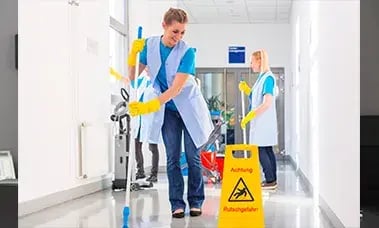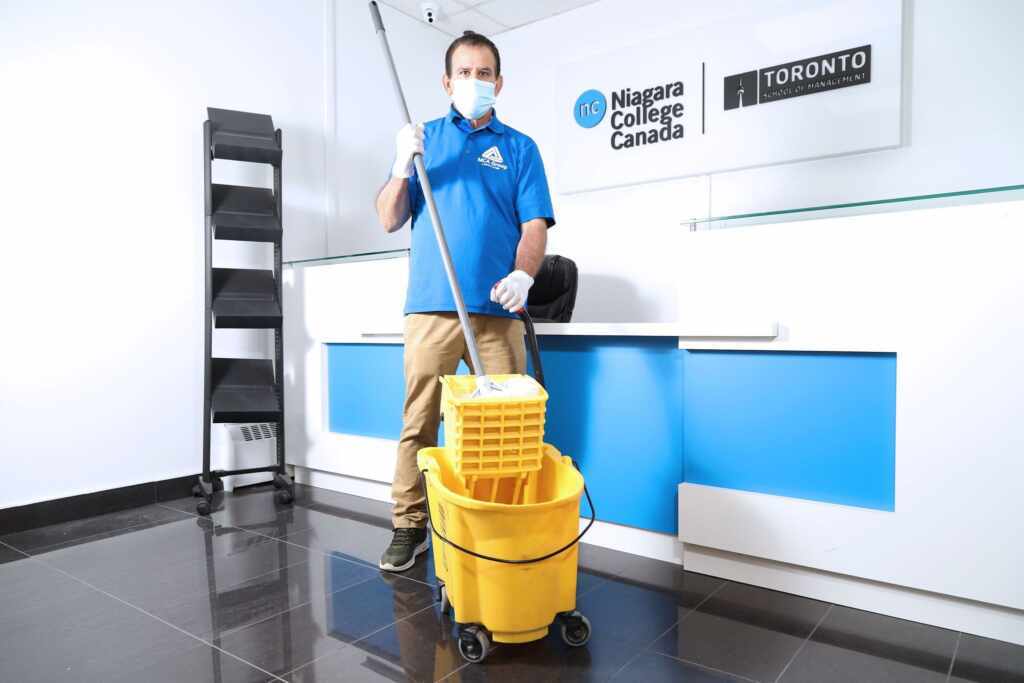
What Are the Roles and Skills of a Commercial Cleaner?
Ever walked into an office and immediately noticed how fresh it feels — like the air itself is lighter? That invisible comfort is often the handiwork of a commercial cleaner. Behind every spotless reception desk and streak-free window is a professional team trained not just to clean, but to create environments where people feel safe, productive, and welcome.
In short: commercial cleaners do far more than sweep floors. They safeguard health, uphold brand image, and keep workplaces compliant.
What Exactly Does a Commercial Cleaner Do?
At its core, a commercial cleaner maintains the hygiene and presentation of workplaces such as offices, schools, retail stores, and healthcare facilities. But the role goes beyond surface shine.
A typical commercial cleaner’s day might include:
-
Routine cleaning – vacuuming, mopping, dusting, and sanitising shared areas
-
Deep cleaning – disinfecting high-touch zones like doorknobs, phones, and desks
-
Waste management – safely handling and disposing of rubbish and recycling
-
Specialised cleaning – such as carpet extraction, window washing, or pressure cleaning
-
Compliance tasks – following safety data sheets (SDS) and WHS regulations
Unlike domestic cleaners, commercial teams often work after hours, using professional-grade equipment and eco-friendly products that meet workplace health standards.
What Skills Make a Great Commercial Cleaner?
A good cleaner wipes surfaces. A great cleaner notices everything.
Here are the key skills that define top-performing professionals in the industry:
1. Attention to Detail
From fingerprints on glass to dust build-up behind monitors — meticulous observation ensures nothing is missed. Cleaners are the quiet guardians of first impressions.
2. Time Management
Commercial jobs are usually timed between shifts or outside business hours. Cleaners must balance thoroughness with efficiency, working to tight schedules without cutting corners.
3. Knowledge of Cleaning Chemicals and Equipment
Understanding which solutions suit which surfaces (and which to avoid) is essential. Using the wrong product can damage materials or trigger allergic reactions.
4. Health and Safety Awareness
Trained cleaners follow strict WHS protocols — from using personal protective equipment to safely storing chemicals. In industries like healthcare or food production, this knowledge is critical.
5. Reliability and Professionalism
Commercial clients rely on consistency. A cleaner’s punctuality, discretion, and respect for private spaces are as vital as their technical skill.
6. Communication and Teamwork
While much of the work is independent, collaboration is key. Coordinating schedules, reporting maintenance issues, and updating supervisors all require clear communication.
How Do Professional Cleaners Support Business Success?
Think of a clean environment as silent marketing. It communicates care, attention, and professionalism — all before a client says a word.
Here’s how commercial cleaning contributes to business outcomes:
-
Boosts employee productivity: A tidy workspace reduces stress and distraction.
-
Reduces sick leave: Regular disinfection limits germ spread — especially in open-plan offices.
-
Protects brand image: Clean premises signal reliability and respect for customers.
-
Extends asset life: Proper cleaning preserves flooring, furniture, and fixtures.
A well-maintained environment doesn’t just look good — it performs better. Studies from Safe Work Australia show that clean, safe workplaces directly correlate with higher employee morale and lower absenteeism.
What Training or Certification Do Commercial Cleaners Need?
While formal qualifications aren’t always required, most reputable providers invest in structured training. This might include:
-
Certificate III in Cleaning Operations (or equivalent)
-
On-site safety induction (including PPE and hazard awareness)
-
Infection control training — particularly post-COVID
-
Equipment operation and chemical handling certification
In Perth and other major Australian cities, top cleaning companies often upskill staff continuously — reflecting Cialdini’s authority principle. Clients feel reassured knowing their cleaners follow industry standards and best practices.
Are Commercial Cleaning Skills Transferable?
Absolutely. Cleaners develop a unique mix of physical endurance, procedural discipline, and customer service — all highly valued across industries like hospitality, aged care, and facilities management.
Many seasoned cleaners advance into supervisory or site management roles, using their frontline insights to train teams and coordinate large-scale operations.
Why Perth Businesses Rely on Professional Cleaning Teams
Western Australian companies face their own environmental challenges — from coastal dust to long dry seasons that stir up allergens. In this climate, maintaining cleanliness isn’t just cosmetic; it’s preventative maintenance.
That’s why many local offices and schools turn to professional Commercial Cleaning Perth services. These experts bring region-specific knowledge, eco-certified supplies, and years of experience ensuring buildings stay safe, compliant, and welcoming all year round.
FAQs
1. What’s the difference between commercial and domestic cleaning?
Commercial cleaning covers business and public facilities, using industrial equipment and following stricter safety standards than home cleaning.
2. How often should workplaces be professionally cleaned?
Daily or nightly for high-traffic areas; weekly or monthly for deep cleans, depending on the size and nature of the business.
3. Do commercial cleaners use eco-friendly products?
Most reputable providers now use biodegradable or low-VOC products to protect both the environment and indoor air quality.
Final Thought
Commercial cleaning is one of those professions people only notice when it’s missing. Yet its impact ripples through productivity, wellbeing, and brand perception. It’s a quiet craft built on precision, reliability, and pride — proof that the smallest details can shape the biggest impressions.

